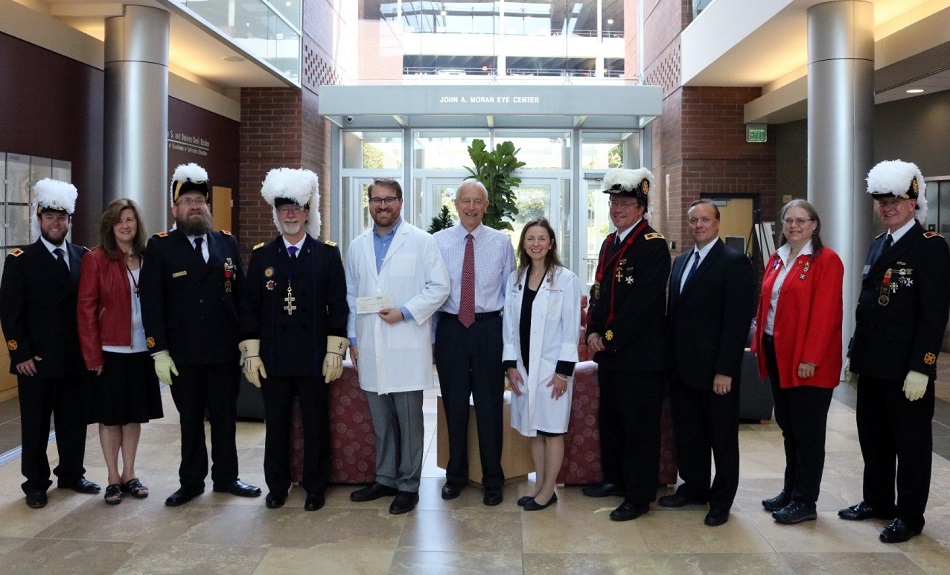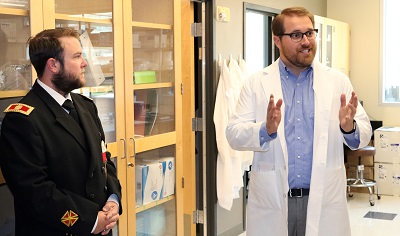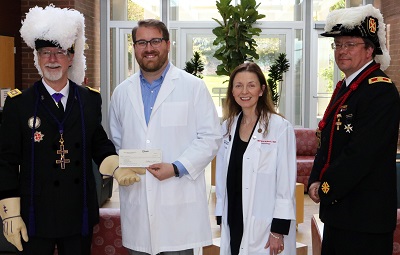
Since 1956, the Knights Templar Eye Foundation (KTEF) has supported research and helped launch the careers of clinical and basic researchers focused on the prevention and cure of potentially blinding diseases in infants and children.
Retinopathy of prematurity (ROP) is one of those diseases.
The leading cause of preventable childhood blindness, ROP affects preterm infants who are born before 31 weeks, before the retina has developed a full network of blood vessels to nourish it.

This June, the KTEF awarded a $65,000 Career-Starter Research Grant to John A. Moran Eye Center retinal researcher Colin Bretz, MS, PhD, for his work to better assess the risk of ROP and the infants in need of treatment.
Working in the National Institutes of Health-funded lab of top retinal research Mary Elizabeth Hartnett, MD, Bretz and his colleagues work to understand what causes blood vessels to grow outside their normal tissue compartments and into other areas of the eye where they cause damage.
Long-term goal: safe treatment
Whether an infant experiences surgery for the most progressive stages of ROP or develops a milder form that eventually resolves on its own, infants with ROP are considered to be at higher risk for developing certain eye problems later in life, such as retinal detachment, myopia, strabismus, amblyopia, and glaucoma.
"Clinical findings have shown that a factor, soluble E-selectin (sE-selectin), is elevated in the bloodstream of preterm infants who develop ROP compared to those who do not. We will study how sE-selectin is elevated and if it is involved in the pathology leading to blindness in ROP. We will use experimental models to understand the role of sE-selectin in ROP as initial steps in our long-term goals to find a safe treatment for ROP and develop biomarkers to better identify preterm infants at increased risk or in need of treatment for ROP," said Bretz.
"We have taken ROP as far as we can—we need something more, something that will move us forward and can make a difference," said Randall J Olson, MD, professor and chair of the University of Utah Department of Ophthalmology and Visual Sciences and CEO of the Moran Eye Center. "Dr. Bretz’s work is translational research at its best, and the Knights Templar Eye Foundation’s support is a wonderful catalyst."

Competitive proposals focus on prevention and correction
Securing federal funding can be difficult for a new researcher, and there are not many other eye foundations that solely fund pediatric research. By offering Pediatric Ophthalmology Research Grants to support physicians and researchers who are beginning their academic careers, the KTEF is investing in the future.
Proposals, vetted by a Scientific Advisory Committee comprised of 10 physicians specializing in pediatric ophthalmology at leading hospitals and research institutions, are highly competitive and must be focused on research that can prevent vision loss—first and foremost—and correct conditions early.
To date, KTEF has expended over $152 million on research, patient care, and education. The organization has awarded research grants totaling over $26 million to researchers working in the fields of pediatric ophthalmology and ophthalmic genetics.
Bretz background
Before joining the Hartnett lab, Bretz completed his doctorate in the lab of John Penn, PhD, at the Vanderbilt Eye Institute, where he focused on identifying critical and potentially therapeutic signaling targets important in the pathogenesis of ocular diseases, such as diabetic retinopathy, retinopathy of prematurity, and age-related macular degeneration.
Bretz obtained his master’s degree in biology from Wake Forest University and his bachelor’s degree in neuroscience from Vanderbilt University.